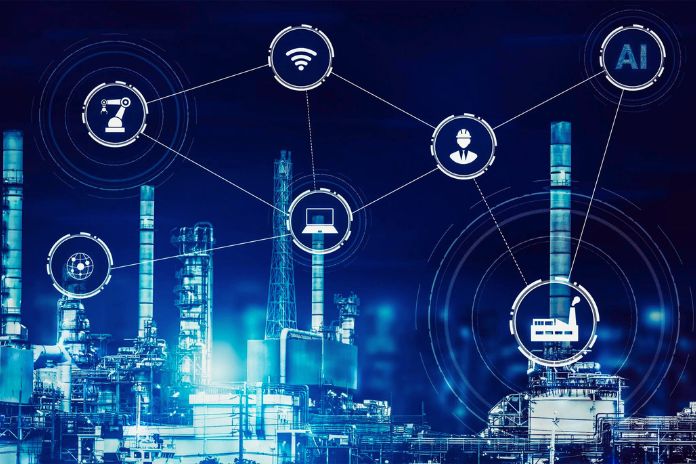Industry 4.0: Modernization and digitization of industrial production bring about a paradigm shift in a world increasingly focused on customer-focused presentations to the detriment of product-focused output.
More than meeting a specific need, industrial processes now have data that allow them to have a more accurate view of where, when and how their products are consumed.
According to experts, these changes are based on what is known as Industry 4.0, the so-called fourth Industrial Revolution.
The arrival of Industry 4.0 enabled changes and ways of acting for companies in different segments that were not possible, for example, in the last century.
But what exactly has changed, and what technologies enable Industry 4.0 to be an inevitable move for industries and other organizations worldwide?
Follow the content below to learn about Industry 4.0 and its leading technologies and impacts.
What Is Industry 4.0?
Also known as the 4th Industrial Revolution, industry 4.0 is part of a sequence of courses that began in the 18th century and affected industrial production processes.
These revolutions brought about crucial changes in how industries work and unprecedented transformations in production and consumption relations.
These changes include new energy sources, such as steam and later electricity, and new production formats, such as assembly lines and process automation.
Since then, new technologies have emerged and modified how industries produce and relate to their partners and how consumers receive products.
For example, industries realized the importance of building and managing a supply chain efficiency to make production leaner and more efficient in its procedures.
This process allowed the agents involved in the production chain to build relationships based on integration and generate more value for the final consumer, which enabled stronger partnerships as a competitive factor in the market.
But what makes Industry 4.0 different from other great revolutions in the industrial sector?
Industry 4.0 adds a new layer to automated production procedures: the digitization of operations and the data that this digitization involves.
We know that the advent of innovations in information technology and large volumes of data has made companies from all segments enter into a digital transformation process.
This means that the methods within a company undergo a transformation process aimed at optimizing and adapting them to a digital reality present in the contemporary world.
For the industries, this meant, in the first instance, the automation of their tools and production that was increasingly focused on the consumer.
Industry 4.0 And The Transformation Of Processes
It must be remembered that Industry 4.0 is about going beyond putting autonomous machines into production; it is about transforming and digitizing production processes based on diverse data.
This modification and the arrival of these new technologies also brought the challenge of managing the large volume of data these tools and means produce, making data intelligence a constant in this new scenario.
Large volumes of data lack a precise interpretation that transforms them into relevant information so that they can finally form the basis for industry decisions and actions.
This relationship between data and information changes how an industry works and, consequently, its relationship with consumers and clients.
This relationship transformation is only possible because these technologies provide the crossing of diverse data and, from there, enable the construction of more accurate diagnoses and scenarios for these companies.
Advents Of Industry 4.0
Regarding the transformations brought about by Industry 4.0, the technologies present in the concept also gain prominence, as they play a vital role in the process.
Whether due to the focus on data, the main characteristic of the tools or even the philosophy that guides a particular performance, some advents are inherent to Industry 4.0, and some examples of these events are:
Artificial Intelligence
Common to several integration tools in the industry, artificial intelligence is a relatively new advent, but it guarantees greater autonomy and accuracy in decision-making in the industry.
Based on human intelligence, artificial intelligence was created to increase the success rates of certain decisions through the perception of the environment and the scenarios placed in it.
Artificial intelligence is also one of the main tools regarding machine autonomy and information generation through compiled data.
Big Data
As we saw earlier, the performance of an industry and the entire procedure that involves it, from production to the final consumer, generates a considerable amount of data that is no longer isolated from the production process.
These large volumes of data are what we call big data; with them, a large portion of the enabling tools we currently have would exist.
Big data also serves as a great ally of artificial intelligence technologies, and its management, when done correctly, is essential for industries.
Cloud Data
The large volume of data produced today also needs ways to facilitate the work around them.
This is the case with technologies that allow data storage in the cloud, which reduces costs for the industry and facilitates the work process from an information point of view.
Robotics
A term already known to the industry, here it is necessary to emphasize robotics in addition to the automation of the production system.
More and more innovations appear on the market that serve as a basis for the work of the industry, such as more intelligent machines that identify errors in production and other information that speed up the production cycle.
Internet Of Things
The advent of the internet created a revolution that allows geographic breaks, exceptional communication and the optimization of diverse processes.
Adding to this, our environment and the elements around us constitute a giant network that is increasingly connected to each other and to the internet.
The philosophy behind the Internet of Things shows us that we are moving towards an increasingly connected world. For industries, this means integrating processes and partners and seeing their products as part of this great network.

